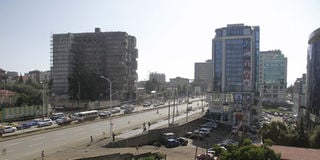United Nations must protect civil society

A section of Bole Road, one of the main streets in Addis Ababa.
What you need to know:
- During the period of detention, it became apparent that the authorities were familiar with my movements during previous visits.
- In the last five years, 12 journalists have been prosecuted and jailed for lengthy terms (as long as 18 years) using the Anti-Terrorism Proclamation (652/2009), clearly demonstrating a campaign by the government to silence dissent.
The third of April could have marked my seventh time to go to Addis Ababa, Ethiopia, in less than two years. But this was not to be.
When I landed at Bole International Airport, the immigration officer refused me entry and I was detained in an office for around 29 hours without any access to legal advice or consular support.
Fortunately, when I had realised I would be detained, I made a phone call to one of my Ethiopian contacts informing him I would not be allowed into the country.
The airport security thereafter confiscated and switched off my mobile phone. During the 29-hour detention, I was only allowed one meal, on the day I arrived, and I could not go even to the washroom without permission.
Following an international campaign for my release, I was deported to Kenya on April 4 and warned I would be promptly arrested and jailed should I return to Ethiopia.
During the period of detention, it became apparent that the authorities were familiar with my movements during previous visits. Security officials made clear they knew the details of whom I had met, as well as where and when those meetings took place.
Article 19, the organisation for which I work, had been supporting Ethiopian journalists in capacity-building, and at the same time collecting information on violations to freedom of expression.
It was one of the last remaining international human rights organisations working in Ethiopia and providing independent information to the UN Human Rights Council and UN special mandate-holders.
On May 6, Ethiopia will undergo the UN’s Universal Periodic Review, a four-yearly assessment of the human rights situation in every country. The review comes under a backdrop of continued harassment of the media and civil society.
MANY HAVE FLED
In the last five years, 12 journalists have been prosecuted and jailed for lengthy terms (as long as 18 years) using the Anti-Terrorism Proclamation (652/2009), clearly demonstrating a campaign by the government to silence dissent.
In each case, the journalists had written articles critical of the government, and in some instances, the articles constituted more than half of the evidence introduced against them during their trial. Many have fled the country to avoid intimidation.
Unfortunately, there is a growing trend for governments worldwide to harass members of civil society to stop them from passing information to the UN and its various mechanisms.
The UN's Human Rights Council in September 2013 adopted resolution 24/24 that commits states to prevent “intimidation or reprisals against individuals and groups who cooperate or have cooperated with the United Nations and its representatives in the field of human rights.”
The resolution calls upon the UN Secretary-General to create a senior focal point within the UN to coordinate an international response on the issues of reprisals, to increase protection for human rights defenders, and to ensure perpetrators of attacks against defenders are held accountable.
It also calls on states to enact national laws and policies that protect human rights defenders, provide people with a right of unhindered access to UN human rights bodies, and prohibit all forms of intimidation or reprisal against people for their work. Ethiopia, a member of the council, abstained in the September vote.
It is time the UN established this important office to address increasing threats against human rights defenders worldwide.
Mr Mutahi works for Article 19, a human rights organisation that promotes freedom of expression and information ([email protected])




